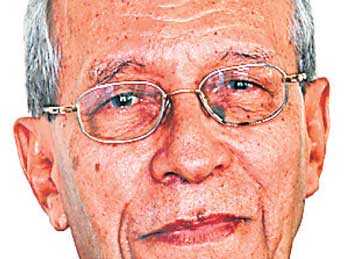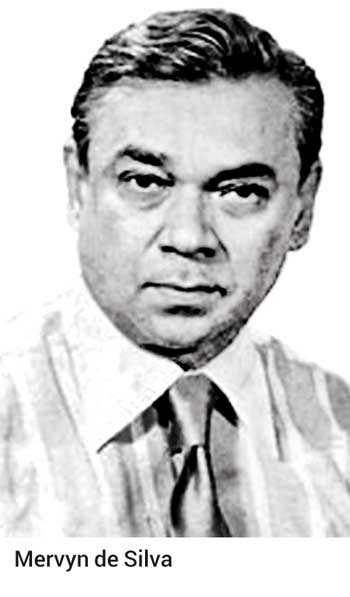Tuesday Feb 24, 2026
Tuesday Feb 24, 2026
Thursday, 5 September 2019 00:00 - - {{hitsCtrl.values.hits}}
by Bradman weerakoon
When Mervyn de Silva passed away, many tributes were paid to his contribution to critical writing, to journalism, to literature and the arts, to his scholarly weekly radio commentaries on world affairs, his lone editorship of the Lanka Guardian and the stimulation he provided to popular discussion by his constant and thoughtful, intellectual engagement with whatever was current in the public debate. 
Yet I personally felt that there was one aspect of his work that had not been sufficiently commented upon or appreciated at the time. Perhaps this was natural, for much of what he did in this area of influencing the making of public policy was generally confidential, its consequences were indirect and unattributable, and above all the depth and intensity of the interaction were known only to a privileged few.
Mervyn made a very substantial and effective contribution, over many years and several administrations, to the making of public policy especially in the arena of foreign affairs. There were possibly others before him in the journalistic profession who had by their personal links to the political leadership transmitted their views and thoughts to the decision makers of the day and who could lay claim thereby to be influential in the making of policy on specific issues. In Mervyn’s case however, it was different.
His influence on the political leadership of the time was non-specific and pervasive. It transcended the bounds of party politics as he was equally at home whether the SLFP was in power or the UNP. And the relationship with the ‘great’ was special, being one of camaraderie and mutual respect rather than hierarchical, as the generality of such interactions become over time. It also was remarkable that Mervyn maintained this vital and unique role over changing political administrations and some five decades of active involvement in the public arena.
Perhaps it was his extraordinary mix of personal characteristics - his affability and exuberance, his cynicism and wit, his grace and self-confidence that made leaders as different as the Bandaranaikes – both SWRD and Sirimavo, J.R. Jayewardene and R. Premadasa take easily, and in fact warmly, to Mervyn de Silva.
Mervyn was always interesting. He was not only totally informed about the subject but could put it across quickly, cogently and with a complete absence of pedantry. Whether it was on the telephone or in person Mervyn could be light where the subject was heavy, find something that was funny in a situation that was serious, counter repartee with equal wit, and have the grace to concede when the contestation seemed irrefutable. 
I have had the privilege of sitting by the side of President Premadasa, for example, when he was on the phone to Mervyn discussing something that Mervyn had written which had appeared in the newspaper. Although the conversation I was overhearing, since the President would insist I stay put, was naturally one-sided, it was obvious that the interaction was giving both parties much enjoyment. There was a great conviviality and chuckling that accompanied the conversation and a degree of detail in subject matter that bespoke an easy familiarity of the pertinent issues that both thought needed to be addressed.
Premadasa did a lot of work on the telephone and as those who know him would testify, could be very informal in approach, introducing himself on the telephone as simply “Premadasa” (which could lead to some embarrassment if a domestic for example lifted the phone when it rang). His easy accessibility would have suited Mervyn well and the telephonic communication between the two men was often, relaxed and highly beneficial I believe, on both sides.
With J.R. Jayewardene, perhaps as befitted the difference in age between the two, Mervyn understandably adopted an attitude that was less collegiate in approach but no less convivial. There was a huge mutual respect between the two men and the conversations would range over many areas - literature, a new book or play at the West-end, cricket, relations with India (or the latest peccadillo of Mani Dixit) or what was happening to the Non-Aligned Movement under Sri Lanka’s leadership.
Mervyn hated J.R.’s stand on the Falklands issue but J.R. was unyielding. In point of fact I think though the relationship was close and an easy affability pervaded their interactions, Mervyn did not make as great an impact on the making of public policy under J.R. as he did later with Premadasa. Premadasa was always willing to learn, but J.R. was like a rock in some of the opinions he held and all of Mervyn’s persuasiveness could hardly make a dent.
Mervyn displayed throughout his life a casualness and nonchalance in approach, which became his trademark. He was James Mason – whom older filmgoers would recall – in looks and behaviour. Although strong in his convictions and tremendously eloquent in giving expression to his thoughts, Mervyn was never opinionated. This flexibility in approach served him well in his relationship to power in the Bandaranaike era.
It was particularly interesting to watch his jousts with Felix Dias who also considered himself an authority on foreign affairs and was Parliamentary Secretary to the Prime Minister who under the Soulbury Constitution dealt with External Affairs. Felix undoubtedly influenced foreign policy making at the time and I think Felix saw Mervyn as a challenge to his undiluted claim to acceptance by Mrs. Bandaranaike. It was certainly vice versa as far as Mervyn was concerned. The two had been contemporaries at Royal and the university and had grown used to measuring each other up all the time.
How Mervyn countered this strong internal critique and yet managed to access and influence decision making by Sirimavo on such issues as the Indian Ocean Peace Zone proposal and related non-aligned issues, speak volumes for his diplomacy, his dexterity and his capacity to listen as well as to persuade. Lesser men have stooped to flattery on the way to an audience with the King, or in this instance the Queen, but Mervyn needed none of these props. His was argumentation based on facts and rationality and the veracity of his line of thinking attracted attention on its own merits shorn of all externalities. Sirimavo Bandaranaike with her direct and unpretentious approach to problem solving appreciated the brilliance of the presentation and I have no doubt even secretly enjoyed the occasional dialectical contestation between the two old Royalists.
But Mervyn’s association with the Bandaranaikes went back to Mr. Bandaranaike to whom he was introduced in the mid-fifties by Nimal Karunatilleke, a journalist turned politician. Although Mr. Bandaranaike would have read with interest the pieces which Mervyn turned out at that time the distance between the two in age alone inhibited the kind of rapport which he enjoyed with the political leaders who followed.
Mervyn’s engagement with the making of Sri Lanka’s foreign policy over almost the last five decades was not limited to his purposeful conversations with the country’s political leadership alone. It had an institutional dimension too, which reflects how strongly he felt about the need to underpin the rhetoric with a solid intellectual infrastructure built on a corps of able and informed Foreign Service men and women supported by a knowledgeable public.
Early in his career he helped found the Ceylon Institute of World Affairs with General Anton Muttucumaru. In the Premadasa period he initiated the Foreign Affairs Advisory Group which attracted men as astute as Gamani Corea, Lakshman Kadirgamar, Stanley Jayewardene and Gamini Wijesinghe to interact with serving Foreign Service officers in charting new pathways congruent with the changing global and regional environment in which Sri Lanka found itself searching for a fulfilling and dynamic role.
While the search still continues, the loss of this remarkable man with his encyclopaedic knowledge of the subject and unerring eye for the phony, who did so much so deftly, and from the outside, to define our foreign policy in the last half-century, will be sorely felt.
[This article was published originally on 5 September 2000 as ‘The Foreign Mervyn’—Mervyn de Silva: A recollection on his 71st birthday.]